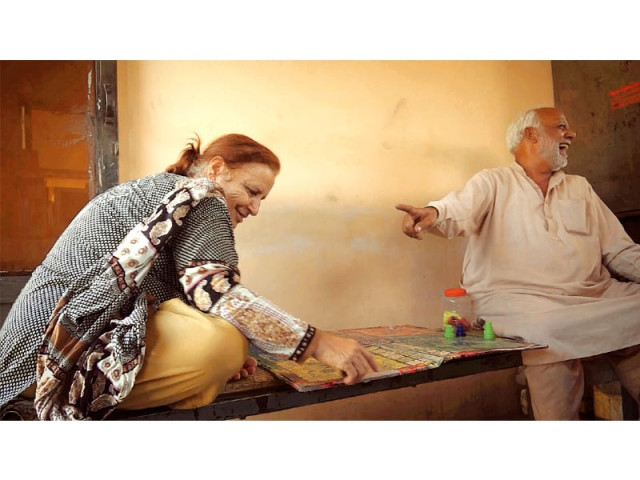The Citizens Foundation-UK’s gripping Film Night
Event showcased films by Sharmeen Obaid Chinoy, Aatif Nawaz and Romanian film-maker Anca Dimofte.

Madam Kazmi and the drivers highlights how Zahida survives among men, who one minute, tell the film-maker that she is of “bad character,” and the next, cordially play Ludo with her. PHOTO: FILE
The Citizens Foundation (TCF) UK held a Film Night on Wednesday at the School of Oriental and African Studies (Soas), University of London.
Hosted by The Centre for the Study of Pakistan and SOAS South Asia Institute, the evening showcased three documentaries: Skoll Foundation’s documentary on TCF by Sharmeen Obaid Chinoy, Aatif Nawaz’s Postcards from Lahore and probably the best one of the evening, Madam Kazmi and the drivers by Romanian documentary film-maker Anca Dimofte.
Anca’s documentary follows the daily life of Zahida Kazmi, who is said to be Pakistan’s only female taxi driver since 1992 who works at the Rawalpindi airport. It invoked the most enthusiastic response from the audience in terms of laughs during its screening and question-and-answer session.
Madam Kazmi starts off on a funny note, with Zahida, an old lady in pink lawn yelling “Paray hutt,” signalling people to move away as she drives.
She tries to talk her way out of a traffic ticket by asserting that a documentary is being made on her, and praying with other taxi drivers that they get passengers and are protected from the wrath of the radio cab.
Later, she even leads a protest against radio cabs for stealing business from yellow cabs and getting priority access at the airport.

However, we soon find out about her struggles; she gets married at the young age of 12, and supports a family of six upon being widowed after the 1972 war. We are made to feel her loneliness, the challenging feat of being the only woman in a sea of hypocritical men, who tell the film-maker that she is of “bad character” and that they do not believe women should work.
But in the very next scene, the same people are laughing with her and playing Ludo. This is the beauty of the film; it conveyed something meaningful in a subtle manner.
One audience member noted that the men were afraid of her, even in awe of her, conveniently exploiting religion as a tool to prevent more like her from coming out of their homes.
Of course, Zahida knows exactly what is said behind her back, as Anca said she is well aware of what she has to deal with. “I loved how she completely dismissed [the comments]. I wanted to confront those men, but she knows her visibility will cause people to be against her,” remarked Anca.
“She believes she is an inspiration for women and I do not think she is a victim of patriarchy. The reality is more complicated,” she added.
Chinoy’s documentary was a well-made rundown of what TCF does and useful for anyone who is not familiar with the charity’s work. Amina Salahuddin, Director of Fundraising at TCF-UK, explained to the keen audience that schools in Pakistan try to maintain a 50-50 male-female ratio and that women possess great resilience and are deeply committed to bettering the community.
………………………………………………………………………………………………………………………………………
………………………………………………………………………………………………………………………………………
As for Postcards from Lahore by Nawaz, who is a British actor, writer and stand-up comedian of Pakistani origin, a lot was left to be desired.
It was a fairly basic, even naïve look at the city and its famous sites, such as Badshahi Mosque and Cuckoo’s Den. It was criticised by one audience member for appearing to be more like a tourism department’s promotional film.
It also had clichés one would hope would be avoided in a documentary about Pakistan. A case in point is how Nawaz’s doctor tells him in the documentary to stay away from street food and the kulfi he gets for Rs5 is a bargain.
Having said that, he seemed genuine in his effort to explain where he was coming from. He had visited Pakistan once at the age of seven and upon his second visit seventeen years later, he wanted to recreate the memories of where his parents had taken him in order to show his partner and British colleagues what the country is all about.
While he was making the documentary, he had no idea that his film would win an Honourable Mention Laurel in the Best Short Documentary category at the Los Angeles Movie Awards 2012. The film is also credited with being the only Pakistani one to have been screened at the Cannes Film Festival in 2013.
TCF raised £1,846.68 after the evening, which is enough to send 308 children to school for one month. “We feel the event was successful in raising awareness about TCF’s distinctive work in Pakistan,” said A’Ishah Waheed, Fundraising Assistant at TCF-UK.
Published in The Express Tribune, March 30th, 2014.
Like Life & Style on Facebook, follow @ETLifeandStyle on Twitter for the latest in fashion, gossip and entertainment.



















COMMENTS
Comments are moderated and generally will be posted if they are on-topic and not abusive.
For more information, please see our Comments FAQ